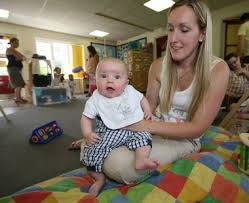
In general, the costs of childcare or home help services are not tax deductible, although there has been some debate about whether they should be. In his 1990 Budget the then Chancellor John Major announced that from April 1990 employees would not be taxed on the benefits they received from using a nursery or play scheme provided by their employer.
In its 2004 Budget the Labour Government announced a new tax relief for childcare benefits: from April 2005, employees would be entitled to receive up to £50 a week of childcare free of income tax and National Insurance contributions (NICs) where their employers contracted with an approved child carer or provided childcare vouchers for the purpose of paying an approved child carer. Employers would be entitled to a similar relief for the first £50 of this type of childcare for the purposes of both secondary Class 1 NICs and Class 1A NICs. This limit was increased by £5 to £55 from April 2006.
In September 2009 the then Prime Minister, Gordon Brown, proposed that this relief should be withdrawn to fund the extension of free childcare for two-year olds. The proposal proved highly contentious and in December 2009 Mr Brown announced that the relief would be retained, but, from April 2011, it would be restricted in value so that all new voucher recipients would get the same amount of tax relief, to ensure that higher rate taxpayers did not benefit disproportionately.
In its first Budget in June 2011 the Coalition Government confirmed that it would take this measure forward. The new income tax limit applies to higher rate and additional rate taxpayers who join employer supported childcare schemes on or after 6 April 2011.
This note discusses the introduction of the existing tax relief for employer-provided childcare and the case there has been made for a wider tax relief, before looking at the decision to restrict the value of this relief for those on higher incomes from 2011/12.
Two other Commons Briefing papers give an overview of Government policy over this period.
In the 2013 Budget the Coalition Government announced it would introduce a new scheme, Tax-Free Childcare, from autumn 2015. To be eligible, families would have to have both parents in work, with each earning less than £150,000 a year, and not in receipt of support for these costs from tax credits or, when introduced, Universal Credit. Following a consultation exercise, in March 2014 the Government published further details. Eligible families would be entitled to receive 20% of their yearly childcare costs, up to a maximum of £10,000 for each child: i.e., support worth up to £2,000 per child each year. Initially the intention was that the scheme would be rolled out to all eligible families with children under 12 within the first year of its operation. Tax relief on employer provided childcare would only continue to be given to existing members of employer schemes, though they would be able to move to this new scheme if they wished.
There have been considerable delays in the implementation of the new scheme. The Government now plans that all eligible parents will be able to apply by the end of March 2018, and that the existing employer supported childcare schemes will remain open to new entrants until April 2018. These developments are covered in a second Commons Briefing paper: Childcare Vouchers and Tax-Free Childcare - Frequently Asked Questions, CBP8055, 11 January 2018.

Leave a comment
Make sure you enter all the required information, indicated by an asterisk (*). HTML code is not allowed.
Join
FREE
Here










